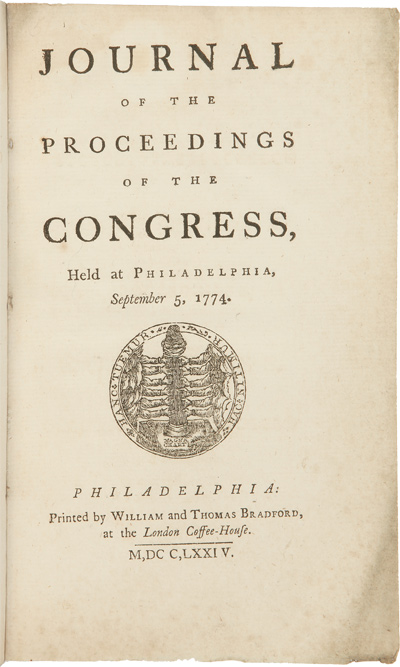Although Congress voted to conduct its deliberations in the strictest secrecy, members were also keenly aware of their responsibility to the public. They therefore engaged in two distinct kinds of communication. During the sessions of the Congress they communicated about the political crisis in Boston--to the public by endorsing the Suffolk Accords, to Governor Gage about his military provocations, and to the Whig leadership in Boston. In preparation for the adjournment, Congress undertook a more comprehensive accounting of what they had done, by arranging for the publication of its "Journal of the Proceedings of the Congress, Held at Philadelpihia." This included the instructions to delegates, an abreviated log of the Congress and a collection of various culminating statesments of rights and grievances, the Association, and diverse addresses of the Congress. (see chart on right)

|
I.
|
Resolves and instructions from the 12 colonies which had appointed delegates (1-22)
|
II.
|
Communications concerning the crisis in Boston: Suffolk accords (30-43) & Request for advice from Boston Committee and letter of Congress to Governor Gage (30-43)
|
III.
|
Rights and Grievances (57-65): “Congress has made the following Declarations and Resolves.”
|
| IV. |
The Association for stopping all imports and exports with signatures of all delegates (68-77) |
V.
|
Various Addresses
To the PEOPLE of Great-Britain (78-92)
To the INHABITANTS of the COLONIES (93-113)
To the colonies of St. John,.. with the publications of the congress (114-115)
To the agents of the colonies in London (on submitting petition to the King) (117-118)
To the INHABITANTS of the Province of QUEBEC (118-132)
To the King, published later as a “Petition of the Continental Congress to the King” (135-144) |
VI.
|
Resolve to meet on 10 May 1775 “unless the redress of grievances, which we have desired, be obtained before that time.” (114) |
NB: Pages from The Journal of the Proceedings of the Congress are referenced in ( ).
|
|

![Protocols of Liberty: Communication, Innovation, and teh American Revolution [Book Banner from Title Page Image]](Images/William_Warner/Protocols_of_Liberty_Illustrations/Protocols of Liberty - Title Banner.png)

